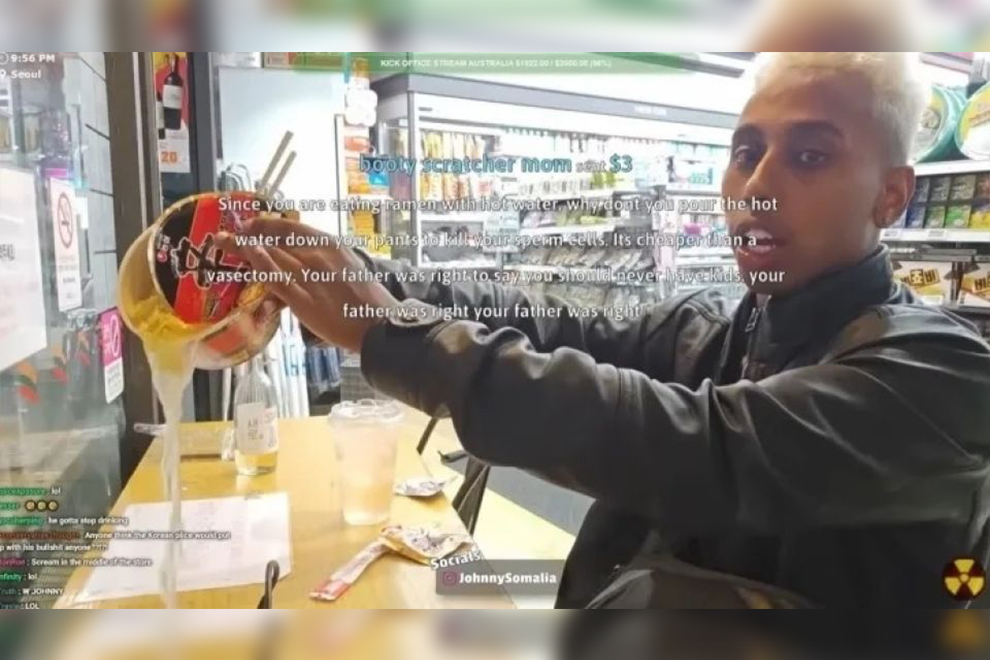
American YouTuber “Johnny Somali” pours ramyeon on a table at a convenience store in Seoul in this screen capture from X. PHOTO: X/THE KOREA HERALD
SEOUL – As he arrived for his second trial hearing at the Seoul Western District Court on May 16, American YouTuber “Johnny Somali” briefly turned to reporters, smiling and sticking out his tongue.
The 24-year-old streamer, whose real name is Ramsey Khalid Ismael, has been barred from leaving South Korea and is being tried on three charges, including obstruction of business and violations of minor public order laws.
Ismael represents a new kind of content creator — one that South Korea is confronting for the first time as the country increasingly attracts YouTube-driven tourism and attention-seeking influencers.
Nuisance influencers, as CNN called them, deliberately stir up trouble in public to generate views and online visibility.
Ismael arrived in South Korea around October last year. His disruptive behavior here, including playing loud music and obscene videos in public and livestreaming himself vandalizing a convenience store, quickly drew attention online. However, the act that sparked the most public outrage occurred on Oct. 9.
On that day, he uploaded a video of himself kissing the Statue of Peace in Itaewon, central Seoul, and performing a lewd dance in front of it. The statue commemorates the victims of Japan’s wartime sexual slavery during World War II — a painful and enduring wound in Korea’s collective memory, stemming from the country’s colonialization by Japan from 1910 to 1945.
He appeared to have discovered one of the most potent triggers of public outrage in South Korea: the nation’s historical trauma with Japan. In another video, he held up the “Rising Sun” flag — a symbol widely associated with Japanese imperialism — and referred to Dokdo, a group of rocky islets in South Korea’s easternmost waters that are at the center of a territorial dispute with Japan, calling them “Takeshima,” the name used by Japan to assert sovereignty over the area.
While these incidents brought him nationwide attention, it was his actions at the Lotte World amusement park, a convenience store, and on public transportation — including subways and buses — that led to criminal charges of business obstruction and violations of public order laws. He is also accused of producing and distributing a deepfake video in which the face of a Korean female streamer was digitally manipulated onto footage that appeared to show her kissing him.
Just as Ismael’s trial began in March, South Korea saw the emergence of another YouTuber with a similar approach.
American YouTuber “Ice Poseidon” came under fire that same month for a livestream in Busan where he and his companions shouted in public, kicked trash and mocked Korean food, saying, “Kimchi is disgusting.”
While riding in a taxi, he also spoke Korean in an exaggerated, mocking tone, seemingly to ridicule the elderly driver.
As public frustration grows over disruptive foreign content creators in South Korea, online users are calling for a boycott of controversial streamers whose offensive behavior appears to be rewarded with attention — and ad revenue.
“Many people keep watching, commenting, and even subscribing while criticizing them. But that attention is exactly what feeds YouTubers like Somali,” one user wrote on X (formerly Twitter). “People should stop giving them any attention, and immigration authorities should prevent them from entering Korea.”
As of May 28, Ice Poseidon, the streamer who sparked outrage in Busan, had 695,000 subscribers on YouTube. Johnny Somali’s YouTube channel has been suspended, making it difficult to determine his current following.
At the same time, South Koreans are calling for the authorities to respond sternly in Ismael’s case to establish a precedent for dealing with similar incidents in the future.
While Ismael was eventually prosecuted, though without physical detention, some people say the initial response from South Korean law enforcement was too lenient, allowing him to persist in harassing locals and disturbing public order.
“I hope a fair and firm ruling is delivered in Johnny Somali’s case to prevent similar incidents from occurring in the future,” said Seo Kyoung-duk, a liberal arts professor at Sungshin Women’s University known for his efforts to promote Korean culture abroad. “A strong punishment should be imposed to set an example,” he wrote on Facebook.
In response to an inquiry from The Korea Herald, an official from the Korea Immigration Service reiterated the general principle that, under Article 46 of the Immigration Control Act, a foreign national may be subject to deportation if their actions are deemed harmful to national interests or public safety.
“A comprehensive review of specific facts, including whether any laws were violated, is necessary before making a determination,” the official added.
Ismael’s third trial hearing is scheduled for Aug. 13. If convicted and sentenced to prison, he would have to serve his term in a local prison. Separately, immigration authorities could review whether to impose a deportation order and a reentry ban, according to legal experts.
Asia News Network/The Korea Herald











